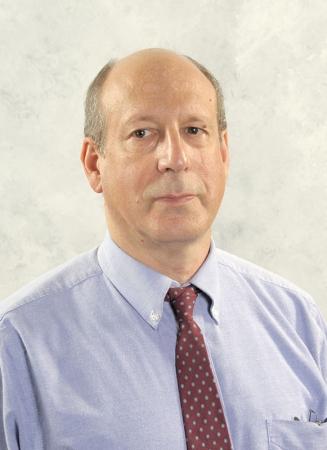Computational materials theorist recognized for pioneering work, service to materials science community

Credit: Lehigh University
Jeffrey Rickman, a professor of materials science and engineering and physics at Lehigh University’s P.C. Rossin College of Engineering and Applied Science, has been elected as a Fellow of ASM International, the leading association of engineers and scientists in the field of materials science.
Rickman was honored October 1 at ASM’s annual awards dinner during the Materials Science & Technology (MS&T) 2019 technical meeting and exhibition in Portland, Oregon. He was recognized for his “significant contributions in computational materials science of defects and phase transformations, pioneering work on materials informatics, and distinguished service to the materials science community.”
The ASM Fellow honor was established in 1969 as one of the highest distinctions in materials science and engineering and recognizes technical and professional leaders who have made distinguished contributions in the field. As a Fellow, Rickman will serve as an adviser to the society’s board of trustees.
“Professor Jeffrey Rickman is a first-class computational materials theorist who has the rare ability to work with experimental colleagues on a wide range of topics,” says Wojciech Z. Misiolek, professor and chair of the Department of Materials Science and Engineering and director of the Loewy Institute.
Since joining the Lehigh faculty in 1993, Rickman’s research interests have included the development of computer simulation methodologies for describing fluids and solids, determination of the elastic properties of defects, and the kinetics of phase transformations. Rickman’s work has been supported by grants from the National Science Foundation (NSF), Office of Naval Research (ONR), and Air Force Office of Scientific Research (AFOSR).
His recent research uses material informatics and electron microscopy to gain insights into the physical mechanisms of high-entropy alloys. These alloys contain different elements that, when combined, may result in unexpected and beneficial thermal and mechanical properties. Rickman and fellow Lehigh collaborators describe their method and findings in an article published in Nature Communications.
“The methods employed here involved a novel combination of existing methods adapted to the high-entropy alloy problem,” Rickman says. “In addition, these methods may be generalized to discover, for example, alloys having other desirable properties. We believe that our approach, which relies on data science and experimental characterization, has the potential to change the way researchers discover such systems going forward.”
At Lehigh, Rickman is a member of the Nano/Human Interface Presidential Engineering Research Initiative, a multidisciplinary research initiative that proposes to develop a human-machine interface to improve the ability of scientists to visualize and interpret the vast amounts of data that are generated by scientific research. He is also affiliated with two of the university’s interdisciplinary research institutes, the Institute for Functional Materials and Devices (I-FMD) and the Institute for Cyber Physical Infrastructure and Energy (I-CPIE).
Throughout his career, Rickman has received several prestigious honors including the Young Investigator Award from the NSF and the Chambers Junior Professorship and the Culler Prize (Miami University). He is a member of several honor societies including Phi Beta Kappa, Phi Kappa Phi, and Sigma Xi, as well as several professional organizations including the Materials Research Society; the Minerals, Metals, and Materials Society (Chemistry and Physics of Materials Committee); and the American Ceramics Society.
He also received a Class of ’61 Professorship at Lehigh for excellence in teaching, research, and service.
###
Media Contact
Katie Kackenmeister
[email protected]
Original Source
https:/




